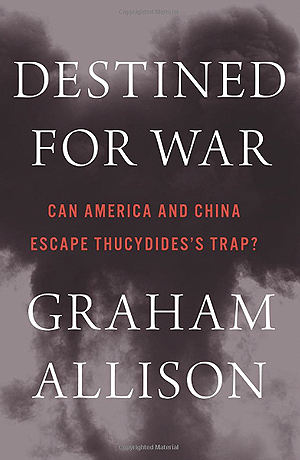Ruta de navegación
Menú de navegación
Blogs
Entries with Categories Global Affairs Asia .
[Graham Allison, Destined for War. Can America and China Escape Thucydides's Trap? Houghton Mifflin Harcourt. Boston, 2017. 364 pages]
This is what has been called Thucydides' trap: the dilemma faced by a hegemonic power and a rising power that threatens that hegemony. Is war inevitable? When Thucydides narrated the Peloponnesian War, he wrote about the inevitability for domineering Sparta and the emerging Athens of thinking of armed confrontation as a means of settling conflict.
The fact that these two Greek polises necessarily thought about war, and eventually came to it, does not mean that they had no other options. History has shown that there are: when Wilhelmine Germany threatened to outwhelm Britain's naval strength, the attempt at sorpasso (accompanied by various circumstances) led to World War I, but when Portugal was overtaken by Spain in overseas possessions in the sixteenth century, or when the United States replaced Great Britain as the world's leading power at the end of the nineteenth century, the transfer was peaceful.
The call to Washington and Beijing to do everything possible not to fall into the trap described by the Greek historian is made by Graham Allison in Destined for War. Can America and China Escape Thucydides's Trap? The Dean The founder of Harvard's Kennedy School of Government reviews several historical precedents in his book. The Belfer Center for Science and International Affairs at the same university, where Allison is a member, has researched them director, in a program called Thucydides's Trap.
This concept is defined by Allison as "the strong structural stress caused when an emerging power threatens to unseat a reigning power. In such a status, not only extraordinary or unexpected events, but even ordinary flashpoints in international affairs can trigger large-scale conflicts."
 |
This structural stress is produced by the clash of two profound sensitivities: the emerging power syndrome ("the reinforced sense that an emerging state has of itself, its interests, and its right to recognition and respect"), and its inverse image, the reigning power syndrome ("the established power exhibits a growing sense of fear and insecurity as it faces signs of decline").
Along with the syndromes, both rival powers also experience a security dilemma: "A rising power may disregard the fear and insecurity of a ruling state because it knows that it itself is well-intentioned. Meanwhile, his opponent misinterprets even positive initiatives, taking them as excessively demanding or even threatening."
The use of military force
Allison starts from the fact that China is already catching up with the United States as a power. It has done so in terms of the volume of its Economics (China has already surpassed the U.S. in purchasing power parity) and in relation to some aspects of military strength (a report Rand Corporation predicted that by 2017 China would have "advantage" or "approximate parity" in 6 of the 9 conventional capacity areas. The author's assumption is that China will soon be in a position to wrest the scepter of the greatest superpower from the United States. Arrived before this status, how will both countries react?
In the case of China, its millennial outlook will likely lead to an attitude of patience, as long as there is some small progress in its development. purpose to increase its global specific weight. Since 1949, China has only resorted to force in three of 33 territorial disputes. In those cases, China's leaders waged war – limited wars, conceived as notice to their opponents – even though the enemy was equal or greater, urged by a status of domestic unrest.
For Allison, "as long as events in the South China Sea generally move in China's favor, it seems unlikely that China will use military force. But the trends in the balance of power were to turn against it, particularly at a time of internal political instability, China would initiate a limited military conflict, against an even larger and more powerful state like the United States."
For its part, the United States can choose several strategies, according to Allison: adapt to the new reality, undermine Chinese power (trade war, foment provincial separatism), negotiate a lasting peace, and redefine the relationship. The author does not give a committee firm, but it seems to suggest that Washington should move between the latter two options.
Thus, he recalls how Britain understood that it could not rival the United States in the Western Hemisphere, and how from there a partnership between the two countries, manifested in the First and Second World Wars. That would have to involve accepting that the South China Sea is a area of Chinese influence. And this is not out of mere condescension, but because the United States is proceeding with a real clarification of its vital interests.
Despite its positive tone, Destined for War is one of the essays of the American establishment where the end of the American era and the passing of the baton to China are most openly announced (it does not seem to envision a multipolar or bipolar world, but rather one of primacy of the Asian power). He is also one of the least emphasises – less, of course, than he should – on the strengths that the United States maintains and the problems that could undermine China's coronation.
